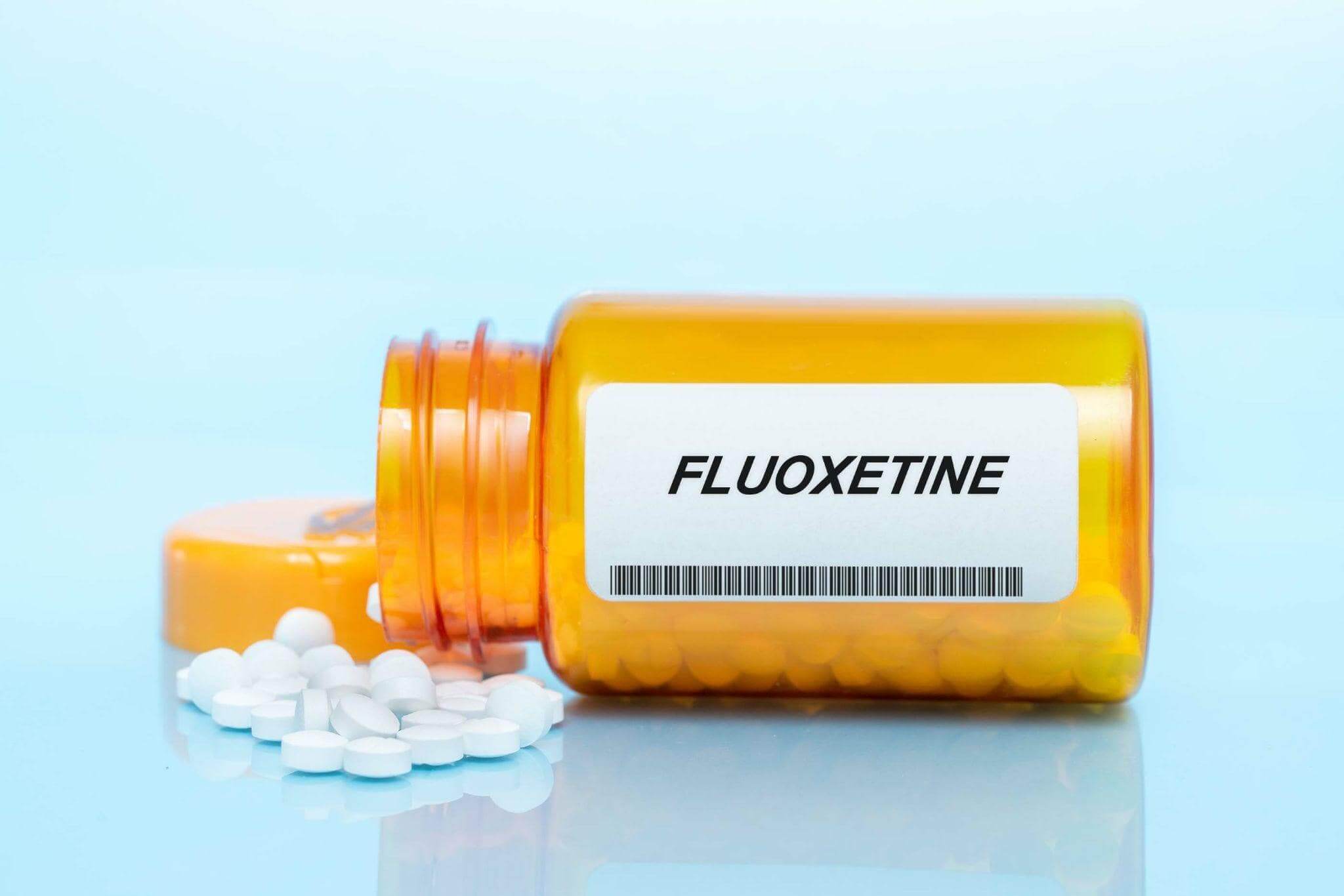Highlights
- Fluoxetine is a prescription antidepressant used to treat depression, bulimia nervosa, obsessive-compulsive disorder, and other mental health conditions.
- Prozac is the most common brand name for fluoxetine.
- Fluoxetine is an SSRI, a class of medication that increases the availability of serotonin in the brain.
- Potential side effects include nausea, loss of appetite, weight loss, headache, sleep trouble, and diarrhea, among others.
- A small number of children and adolescents have reported suicidal thoughts when taking fluoxetine.
Happy feelings don’t come naturally to everyone. In some cases, chemical imbalances in the brain can lead to feelings of depression, anxiety, and other conditions. Fluoxetine helps improve the quality of life for patients with depression and other mental health conditions. Read on to learn more about fluoxetine’s uses, formulas, side effects, contraindications, and other essential information.
What Is Fluoxetine and What Is It Used For?

Fluoxetine is one of the most widely used antidepressants. It was approved by the FDA in 1987 and marketed under the brand name Prozac in 1988. Other brand names include:
- Rapiflux
- Sarafem
- Selfemra
Fluoxetine is prescribed to treat a range of conditions, including:
- Major depressive disorder
- Obsessive-compulsive disorder
- Bulimia nervosa
- Premenstrual dysphoric disorder (PMDD)
- Panic disorder
- Post-traumatic stress disorder (PTSD)
It may also be prescribed alongside olanzapine (Zyprexa) to treat depression associated with bipolar disorder.
How Does Fluoxetine Work?
Fluoxetine is a selective serotonin reuptake inhibitor (SSRI) that increases serotonin activity in the brain. Serotonin is a neurotransmitter that carries signals between brain cells. It is responsible for producing feelings of happiness, satisfaction, and optimism.
SSRIs block serotonin from being reabsorbed by brain cells, allowing this chemical to be more widely available in the brain. SSRIs primarily affect serotonin without disturbing other neurotransmitters.
Fluoxetine Dosage and Administration
Fluoxetine is available in several oral formulations and dosage strengths.
- Delayed-release capsule (90 milligrams)
- Oral solution (20 milligrams/5 milliliters)
- Tablet (10, 20, or 60 milligrams)
- Capsule (10, 20, or 40 milligrams)
Most forms of this medication are taken once daily and typically start at 20 milligrams, though the starting dose can vary depending on the condition being treated. Delayed-release capsules are usually taken once per week. Lower doses may be recommended for patients who poorly tolerate side effects. Conditions such as bulimia nervosa may require higher doses.
How Should I Take Fluoxetine?
It’s generally recommended that fluoxetine be taken with food to minimize the potential for stomach upset. It’s best to take the medication at the same time each day, either in the morning or at night. Delayed-release capsules should be taken around the same time each week.
Dosage and frequency are based on your medical condition. Make sure you follow your doctor’s instructions. Keep in mind you may need to take this medication for several days or weeks before noticing any signs of improvement.
Fluoxetine Warnings and Precautions
In addition to the side effects, contraindications, and drug interactions listed below, people taking fluoxetine should educate themselves about serotonin syndrome.
Serotonin syndrome is a potentially life-threatening medical condition characterized by an excess of serotonin, a neurotransmitter, in the brain. It typically occurs when multiple medications, particularly those that affect serotonin levels, like SSRIs and serotonin-norepinephrine reuptake inhibitors (SNRIs), are taken together or in excessive doses.
Symptoms of serotonin syndrome can include agitation, hallucinations, rapid heartbeat, fever, muscle stiffness, tremors, incoordination, stomach cramps, nausea, vomiting, and diarrhea.
Serotonin syndrome requires immediate medical attention as it can lead to serious complications, including seizures, high fever, and even organ failure if left untreated.
What Are the Potential Side Effects of Fluoxetine?

Like other antidepressants, fluoxetine may cause side effects. Common side effects include:
- Nausea
- Diarrhea
- Sleep trouble
- Weakness
- Yawning
- Loss of appetite
- Weight loss
- Stuffy nose
- Decreased libido
- Headache
- Difficulty concentrating
- Agitation
More serious side effects may occur and should be discussed with your doctor. These include:
- Allergic reactions
- Suicidal thoughts
- Seizures
- Abnormal bleeding or bruising
- Unusual changes in mood or behavior
- An increase in talking or activity
In many cases, side effects will improve as your body becomes accustomed to the medication. For this reason, it’s a good idea to wait until side effects wane before making medication adjustments.
What Should I Avoid When Taking Fluoxetine?
The following are precautions you should take while you’re on this medication:
- Avoid alcohol while taking this medication.
- Use of NSAIDs with fluoxetine may increase your risk of gastrointestinal or other bleeding.
- Diabetics should proceed with caution, as fluoxetine may affect blood sugar levels.
- Serotonin syndrome has been reported with fluoxetine when taken alone or with other medications.
- Do not take any other medications (including prescription, over-the-counter medications, and herbal supplements) with fluoxetine unless you have discussed them with your doctor.
- Avoid driving or operating hazardous machinery until you know how fluoxetine will affect you.
- Do not stop taking fluoxetine without first consulting your physician.
What Should I Do If I Miss a Dose of Fluoxetine?
If you miss a dose of fluoxetine, take it as soon as you remember unless it is close to time for your next dose. Never double up doses to make up for a missed dose.
What Should I Do If I Overdose on Fluoxetine?
If you suspect a fluoxetine overdose, contact the poison control center (1-800-222-1222). Common signs and symptoms of a fluoxetine overdose are:
- Seizure
- Nausea
- Tachycardia
- Vomiting
Contraindications
Who Should Not Take Fluoxetine?
According to FDA Prescribing Information, people in the following groups should not take this medication:
- Those with known hypersensitivity to fluoxetine.
- People taking other SSRIs or SNRIs, like citalopram (Celexa), escitalopram (Lexapro), paroxetine (Paxil), or sertraline (Zoloft).
- Those who take the antipsychotics pimozide (Orap) or thioridazine (Mellaril).
- People taking monoamine oxidase inhibitors (MAOIs). The combination of MAOIs and fluoxetine is potentially dangerous. Do not take fluoxetine within 14 days of stopping an MAOI used to treat psychiatric disorders. MAOIs include drugs such as:
- selegiline (brand names Eldepryl or Emsam)
- isocarboxazid (Marplan)
- phenelzine (Nardil and others)
- tranylcypromine (Parnate and others).
Who Should Take Fluoxetine With Caution?
Again according to FDA Prescribing Information, patients who are pregnant or planning to become pregnant or are breastfeeding should consult with their physician. Fluoxetine should only be taken when the benefits justify the potential risks to the fetus.
It’s been documented that a small number of children, adolescents, and young adults experience suicidal thoughts after taking fluoxetine. While the risk is very low, these people may be at a higher risk of suicide compared to those not taking fluoxetine. If you notice any unusual behavior or mood changes, talk to the prescribing provider right away.
Are There Any Other Potential Drug Interactions With Fluoxetine?
According to Drugs.com, a total of 660 medications can interact with fluoxetine. These interactions range from major to minor.
Major Drug Interactions
Drugs.com lists 159 major drug interactions with fluoxetine that can lead to life-threatening effects. Examples include:
- Duloxetine: May lead to serotonin syndrome, with symptoms including hallucinations, seizures, extreme changes in blood pressure, stomach cramps, and muscle spasms.
- Thioridazine: This combination may increase the blood level of thioridazine to a dangerous level and cause life-threatening heart rhythm irregularity.
- St. John’s Wort: This may lead to serotonin syndrome, which could result in a coma or death.
- Phentermine: Fluoxetine may increase the side effects of phentermine, including jitteriness, restlessness, nervousness, and anxiety.
Other Drug Interactions
The complete interaction list for fluoxetine includes 479 moderate interactions and 22 minor ones. It’s a good idea to check this list before beginning this medication.
In addition to these drugs, fluoxetine may also interact with vitamins, herbal supplements, and over-the-counter medications and supplements. Make sure your providers know everything you take before you start this medication.
Is Fluoxetine Right for You?
Fluoxetine provides safe and effective relief for many patients experiencing major depressive disorder and other mental health conditions, allowing them to live a higher quality of life. However, all medications come with side effects and contraindications.
It’s essential to be informed about fluoxetine’s purpose and what to expect when taking this medication. Once you and your doctor agree that fluoxetine might be a good option for you, your next priority is to find out how to get your fluoxetine prescription at the most affordable price.
Get the Lowest Price for Fluoxetine With BidRx
Get the lowest price for fluoxetine with BidRx. We let pharmacies compete for your business to help you save money on prescriptions. Get a free account to create your bid today!
Please note that this information is intended for general informational purposes only. It is not a substitute for professional medical advice, diagnosis, or treatment. Always seek the advice of your physician or other qualified health provider with any questions you may have regarding a medical condition or medication.
